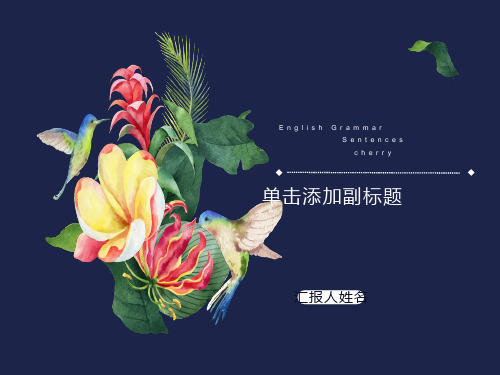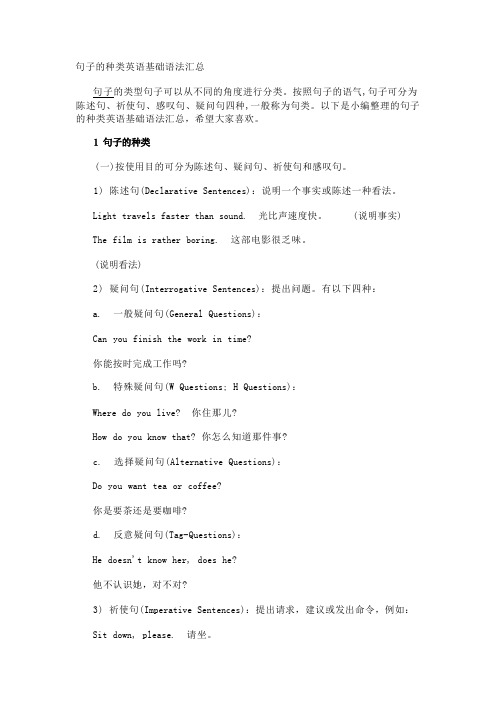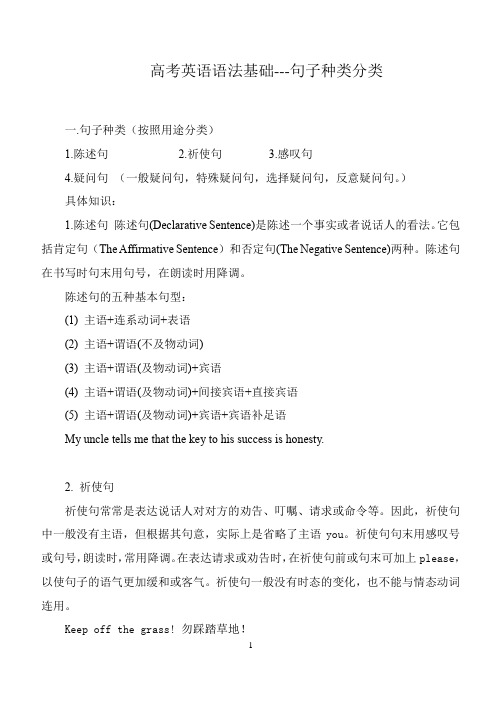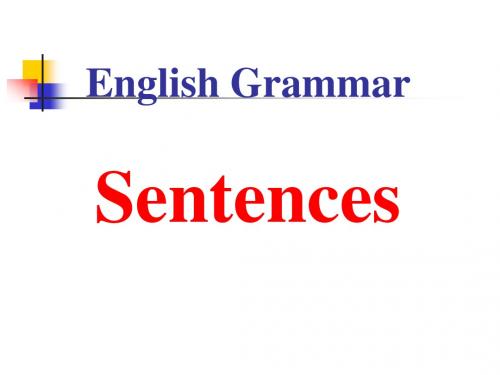英语句子种类
英语中句子的种类

三句子的种类句子是一个独立的语言单位,表示一个完整的思想.按使用目的可分为陈述句、感叹句、疑问句和祈使句;从结构上又可分为简单句、并列句和复合句.按使用目的分:一、陈述句That boy always helps others.Tom was not at home yesterday.He is too late to catch the bus.二、疑问句一般疑问句、特殊疑问句、选择疑问句和反意疑问句Are you a doctorHow often do you have an English partyWhich would you like better, tea or coffeeShe is too young to go to school, is she三、感叹句(一)What +a /an+形容词+可数名词的单数形式+主语+谓语 ==二How+形容词+a/an +可数名词的单数形式+主语+谓语What a beautiful girl she is == How beautiful a girl she is三 What+形容词+可数名词的复数+主语+谓语What beautiful girls they are(四)What+形容词+不可数名词+主语+谓语What fine weather it is(五)How+形容词或副词+主语+谓语How interesting the dog is(六)How+主语+谓语How time flies四、祈使句祈使句主语通常被省略,谓语动词用原型.Be quietDon’t be late从结构上分:一、简单句句子只包含一个主谓结构.如,五种基本句型列式如下:基本句型一:主+系+表基本句型二:主+谓基本句型三:主+谓+宾基本句型四:主+谓+间宾+直宾基本句型五主+谓+宾+宾补.二、并列句句子包含两个或多个主谓结构,通常有并列连词连结.由并列连词把两个或两个以上的简单句连在一起的句子叫并列句.不同的并列连词表示并列分句之间的不同关系.根据并列分句之间的关系不同,并列句可以分为以下几种: 1.表示联合关系的并列句这类并列句常用并列连词and 和,not only ... but also... 不但……而且……等来连接,这时分句之间是顺承关系或并列关系.and一般不译出来.1. We bought her a birthday present,_____ she liked it very much.A. soB. orC. andD. but2. — Didn’t you give roses to your father on Father’s Day— Oh, not only my father,_____ my grandpa got red roses.A. orB. andC. butD. until2.表示转折关系的并列句这类并列句常用but 但是;可是,yet可是;然而,while 而等来连接,后面分句与前面分句之间有意义上的转折关系.1. — Would you like to go to the concert with me— I’d love to,_____ I can’t. I have a lot of homework to do.A. orB. butC. soD. and2. The doctors tried their best to save the patient’s life,_____ failedA. orB. soC. butD. because3.表示选择关系的并列句这类并列句常用并列连词or或者,either …or …要么……,要么……等连接.1. _____ Lily _____ Lucy may go with you because one of them must stay at home.A. Not only; but alsoB. Neither; norC. Both; andD. Either; or2. None of the shoes in the shops are the right size. They are _____ too big _____ too small.A. both; andB. neither; norC. either; orD. not only; but also3. “Are you going to eat here ____ take it away” asked the waiter..A. andB. soC. orD. but.4.表示因果关系的并列句这类并列句常用并列连词so因此;所以,for 因为等连接,后面分句与前面分句之间有因果关系.1. Mother was ill,_____ Father cooked for us instead.A. butB. orC. soD. and2. There is a lot of traffic in this city,_____ look both waysbefore crossing the streetA. soB. andC. butD. for特殊的并列句1.祈使句+and+一般将来时的句子这个句型表示“如果做到了祈使句表示的事情,就会有后面句子表示的结果”.2.例如: Study hard,_____ you are sure to have a good resultin the exam.A. orB. andC. forD. but3. 2. 祈使句 + or + 一般将来时的句子这个句型表示“如果做不到祈使句表示的事情,就会有后面句子表示的结果”4.例如: 1. Be quick,_____ we’ll be late for class.A. orB. soC. andD. but2. Come a little earlier next time,_____ you’ll miss thebest part of the TV play.A. andB. butC. orD. till三、复合句复合句Complex Sentence由一个主句Principal Clause和一个或一个以上的从句Subordinate Clause构成. 主句是全句的主体,通常可以独立存在;从句则是一个句子成分,不能独立存在.从句不能单独成句,但它也有主语部分和谓语部分,就像一个句子一样.所不同在于,从句须由一个关联词引导. 我们至今学过的从句有:定语从句, 名词性从句主语从句、宾语从句、表语从句、同位语从句,和状语从句.1. 定语从句 He is the man who wants to see you.2. 同位语从句 She told us her hope that she would become a pianist.注意:定语和同位语从句的区别.3. 表语从句 This is what we should do4. 宾语从句注意it做形式宾语Everybody knows that money doesn't grow on treesWe think it wrong that he told a lie to everyone. it做形式宾语5.主语从句注意it做形式主语What caused the accident remains unknownIt is certain that he will win the matchit做形式主语6.状语从句MyfriendsdislikemebecauseI’mhandsomeandsuccessfu l.。
英语句子种类

---Haven’t you been to the UK? ---No, I haven’t.
2)特殊疑问句 疑问词有 who,whose,what,which,where,when, why,how等。 (1)陈述语序 Who was the first man in space? (2)倒装语序 Who are you talking about?
4)反义疑问句 does 1.Tom hardly knows French, ______ ______? he 2. — Mary didn't fail her exam, did she? —— ______, she didn’t. No 3.You needn’t come, ______ you? must You need to come, ______ you? don’t 4.He had a big time there, ______ he? didn’t He had a car, ______ he? hadn’t We hardly have to get up early, ____ we? do didn’t 5.He used to live in Leeds, ______ he?
注:A、简略式 Why not go alone? Why get so angry? How/What about taking a rest? B、复杂特殊疑问句 What do you think he has done?
3)选择疑问句 (1)以一般疑问句为基础 Is he a teacher or a doctor or a policeman? Shall I help you or can you manage? (2)以特殊疑问句为基础 Which do you prefer, red wine or white? How shall we go there? By bus or by train?
英语句子种类

句子可分为三种:
1.Simple sentence 简单句 (单一主语+单一谓语+其他成分) eg: Margie hated school.
2. Compound sentence 并列句 (and, but, or 等并列连词连接的两 个各有主谓的简单句) eg: Jerry likes reading and she has read lots of books.
3
I can’t swim. Li Ping is sitting under the tree. 我不会游泳。 李平正坐在树下。 The children are playing on the playground. 孩子们在操场上玩。 The plane disappeared in the sky. Great 飞机消失在天空中。 place in our changes have taken 近几年,我国发生了很大的变化。 country recently. 马丽没回答。 Mary didn’t answer. 那儿发生了什么事? What happened there? 她一言不发就走了。 She left without saying a word.
常见的系动词有 be,become,get,grow,look,turn,feel, taste,smell,seem,remain,sound,ke ep,fall,appear,go,etc. 2. S + Vt + O 主语+及物动词+宾语
3. S + Vi 主语+不及物动词 4. S + Vt + D.O 主语+及物动词+双宾语 give, show, tell, lend, write, pass, hand, send, bring, return, sing, make, do, buy,etc. 双宾:1) 间接宾语(人)+直接宾语(物) 2)直接宾语+for/to+间接宾语
英语语法句子种类与类型

型
whenever, as long as, as soon as; the
moment, every time, next time; no
sooner…than, hardly…when );
2、地点(where, wherever) ;
3、方式(as, as if, as though) ;
4、程度(as…as, more than, so…that, such…that) ;
6.Let’s go to the match at once, ______ we?
子
Leave me alone, ______ you?
种 类
7.They have been learning to drive, ______ they?
8.No one was hurt, ______ ______ ?
1、简单句 只包含一个主谓结构,个个成分都是 单词或短语的句子。
句
All roads lead to Rome.
子
He got up, dressed quickly, washed himself and went out.
类 型
Is he a superman?
Don’t be shy. Have a try.
English Grammar
Sentences
英语句子种类与类型
I、句子种类(按交际用途分) 陈述句、疑问句、祈使句、感叹句、 There be存在句
II、句子类型(按句子结构分) 简单句、并列句、复合句、并列复合句
提 纲
英语句子的种类

英语句子的种类 (1)1.1句子的种类 ..................................................................1.2 1 1.2 陈述句 .........................................................................................1.31 1.3 疑问句 ......................................................1.41 1.4 祈使句 ..................................................................................................................1.5 3 1.5 感叹句 .........................................................................................................1.6 4 1.6 there be结构 .................................................................................................1.74 1.7 否定结构 (5)英语句子的种类1.1 句子的种类句子按其用途可分为陈述句、疑问句、祈使句和感叹句四种。
如:(1)The English have a wonderful sense of humor.英国人有一种奇妙的幽默感。
(陈述句)(2)Who is your favorite author?谁是你喜爱的作家?(疑问句)(3)Don’t believe all the gossip you hear.别轻信听来的一切闲言碎语。
英语句子种类

My deskmate often makes me laugh.
常见的可接不带to不定式当宾补的动词有: 一感二听三让五看” feel,/ hear, listen to, / let, make, have, /look at, see, , watch, notice, observe V + O + OC (V sb do sth)
英语句子基本成分示意图
宾语 宾语 宾补 宾语(间) 宾语(直) Vi(不及物动词)
表语
系动词
I like the golden eagle.
It has a hooked beak.
It looks strong.
It is lovely.
S
S
S
S
V
V
linking verbs(系动词)
for, so, therefore, thus
or, otherwise, either…or
练习:用适当的连词填空
1.August is the time of the year for harvesting , ________every day I work from dawn until dark. 2.He is a basketball fan,____ his wife is a volleyball fan. 3.Honey is sweet,_____ the bee stings. 4.Don’t be late, ______there is a meeting. 5.Hurry up, ____you’ll be late. 6.He works hard ______his brother is a lazy bone. 7.He was enjoying his KFC _____ a friend came.
句子的种类英语基础语法汇总

句子的种类英语基础语法汇总句子的类型句子可以从不同的角度进行分类。
按照句子的语气,句子可分为陈述句、祈使句、感叹句、疑问句四种,一般称为句类。
以下是小编整理的句子的种类英语基础语法汇总,希望大家喜欢。
(一)按使用目的可分为陈述句、疑问句、祈使句和感叹句。
1) 陈述句(Declarative Sentences):说明一个事实或陈述一种看法。
Light travels faster than sound. 光比声速度快。
(说明事实)The film is rather boring. 这部电影很乏味。
(说明看法)2) 疑问句(Interrogative Sentences):提出问题。
有以下四种:a. 一般疑问句(General Questions):Can you finish the work in time?你能按时完成工作吗?b. 特殊疑问句(W Questions; H Questions):Where do you live? 你住那儿?How do you know that? 你怎么知道那件事?c. 选择疑问句(Alternative Questions):Do you want tea or coffee?你是要茶还是要咖啡?d. 反意疑问句(Tag-Questions):He doesn't know her, does he?他不认识她,对不对?3) 祈使句(Imperative Sentences):提出请求,建议或发出命令,例如:Sit down, please. 请坐。
Don't be nervous! 别紧张!4) 感叹句(Exclamatory Sentences):表示说话人惊奇、喜悦、愤怒等情绪,例如:What good news it is! 多好的消息啊!(二)句子按其结构可以分为以下三类:1) 简单句(Simple Sentences):只包含一个主谓结构句子叫简单句,例如:She is fond of collecting stamps. 她喜欢集邮。
高考英语语法句子类型及句子成分基础知识点

高考英语语法基础---句子种类分类一.句子种类(按照用途分类)1.陈述句2.祈使句3.感叹句4.疑问句(一般疑问句,特殊疑问句,选择疑问句,反意疑问句。
)具体知识:1.陈述句陈述句(Declarative Sentence)是陈述一个事实或者说话人的看法。
它包括肯定句(The Affirmative Sentence)和否定句(The Negative Sentence)两种。
陈述句在书写时句末用句号,在朗读时用降调。
陈述句的五种基本句型:(1) 主语+连系动词+表语(2) 主语+谓语(不及物动词)(3) 主语+谓语(及物动词)+宾语(4) 主语+谓语(及物动词)+间接宾语+直接宾语(5) 主语+谓语(及物动词)+宾语+宾语补足语My uncle tells me that the key to his success is honesty.2. 祈使句祈使句常常是表达说话人对对方的劝告、叮嘱、请求或命令等。
因此,祈使句中一般没有主语,但根据其句意,实际上是省略了主语you。
祈使句句末用感叹号或句号,朗读时,常用降调。
在表达请求或劝告时,在祈使句前或句末可加上please,以使句子的语气更加缓和或客气。
祈使句一般没有时态的变化,也不能与情态动词连用。
Keep off the grass! 勿踩踏草地!Always keep in mind that your main task is to get this company running smoothly.3. 感叹句感叹句的基本构成形式1).What(+a/an)+形容词+名词+主语+谓语!2).How+形容词+a/an+可数名词单数+主语+谓语!3).How+形容词/副词+主语+谓语!You can't imagine how crucial a role the pigeons played in the battlefields.你无法想象在过去的战场山鸽子发挥了多么重要的作用。
语法句子种类

语法学习:句子的种类英语中的句子按其构成结构分为:简单句、并列句和复合句。
按其语义功能分为:陈述句(肯定句和否定句)、疑问句(一般疑问句、特殊疑问句、选择疑问句和反意疑问句)、祈使句和感叹句。
1.陈述句:说明一个事实或陈述一种看法。
Light travels faster than sound.光比声速度快。
(说明事实)The film isn't interesting.这部电影很乏味。
(说明看法)2.疑问句:(1)一般疑问句(General Questions):Can you finish the work in time?你能按时完成工作吗?(2)特殊疑问句(W Questions;H Questions):Where do you live?你住哪儿?How do you know that?你怎么知道那件事?(3)选择疑问句(Alternative Questions):Do you want tea or coffee?你是要茶还是要咖啡?(4)反意疑问句(Tag Questions):He doesn't know her,does he?他不认识她,对不对?在构成反意疑问句时,当前面的陈述部分为祈使句时,后常用will you 来构成反意疑问句;只有以let's 开头的句子,后用shall we 来构成反意疑问句。
例:Close the door after you,will you?Let's play basketball together,shall we?3.祈使句(Imperative Sentences):提出请求,建议或发出命令,祈使句的肯定句都是以动词原形开头,其否定句都是在动词原形前加Don't。
例如:Sit down,please.请坐。
Don't be nervous!别紧张!4.感叹句(Exclamatory Sentences):表示说话人惊奇、喜悦、愤怒等情绪,感叹句的构成有三种形式:①What+a/an(adj)+单数可数名词+主语+谓语②What+(adj)复数名词/不可数名词+主语+谓语③How+adj/ad v+主语+谓语例:What good news it is!多好的消息啊!How fast the birds fly!鸟儿飞得多快啊!How beautiful the gile is!这个女孩多么漂亮啊!。
英语句子种类与类型

2、疑问句 (Interrogative sentence)
I
有一般疑问句、特殊疑问句、选择疑问句、
反义疑问句。
、 句
1)一般疑问句 (General Questions)
子 种
以情态动词,助动词或系动词Be开头的疑问句。 类
用来询问一件事,答案通常是yes或 no,注意语序。
句 子
7、目的(so that,in order that,in case) ;
类 型
8、条件(if,unless) ;
9、让步(though,although,even if,even though,in spite of the fact that ,whenever,wherever,whoever,whichever,
However,no matter how,whether) 。
3、复合句
并列复合句 即并列连词连接了带
从句的并列句。
二
、
English is widely used in the world, but China 句
has the largest number of people who speak 子
The man dressed in black seems to be a spy.
2、并列句 包含两个或更多互不依从的主谓
结构,分句由并列连词and,then,but,or,or
else,so,for,while,when;both…and,either
…or,neither…nor,not only…,but also,as
用来表达命令、要求、请求、劝告等。说话的对象 是第二人称时,you经常被省略。句末用句号或者叹号。
英语句子的种类

school?
答案:How soon
8.English is very useful.(改成感叹句)
→________ ________ useful subject English is!
答案:What a 9.The knife in the box is e ________ in the boxes ________ Toney’s. 答案:knives;are
3.The teacher has told us how we should improve our speaking skills.(改为简单句)
→The teacher has told us how ________
________ our speaking skills. 答案:to improve 4.Was the machine invented by David?She wasn’t sure.(合并成一句话) →She wasn’t sure ________ the machine was invented by David. 答案:if/whether
10.Kevin will take a holiday to France the
week after next.(用two weeks ago改写句子) →Kevin ______ a holiday to France two weeks ago. 答案:took
句子的种类
句子的种类
一、按语气可分为:陈述句、疑问句、感叹句和祈 使句。 1.陈述句
叙述或否定一个事实或看法。可分为肯定句和否定
句两种。 肯定句:We love our motherland.我们热爱祖国。
否定句:They don’t go to work on Sundays.
英语语法之句子的种类

英语语法之句子的种类一、分类:按使用目的可分为陈述句、疑问句、祈使句和感叹句。
1. 陈述句:说明一个事实或陈述一种看法。
He gets up at six. 他六点钟起床。
(说明事实)I don't think so .我不这么认为。
(说明看法)2.疑问句:提出问题。
①一般疑问句:Can you finish the work in time?你能按时完成工作吗?②特殊疑问句:Where do you live?你住那儿?How do you know that? 你怎么知道那件事?③选择疑问句:Do you want tea or coffee?你是要茶还是要咖啡?④反意疑问句:He doesn't know her, does he?他不认识她,对不对?3. 祈使句:提出请求,建议或发出命令Sit down, please.请坐。
Don't be nervous!别紧张!4. 感叹句:表示说话人惊奇、喜悦、愤怒等情绪.1.陈述句:①肯定式:This is my sister .I like reading books at weekends .②否定式:A: "be+not" I am not a student.B:"do\does\did +not" He does not like playing basketball.C:"助动词\情态动词+not" I can not swim.D:用no、nothing、nobody表否定.I know nothing about it.2. 一般疑问句:①定义:用be动词、助动词或情态动词置于句首,可用“yes”或“no”来回答的问句。
②应答:用yes\no(或相当于“yes”或“no”的词)回答,并根据句首的be动词、情态动词或助动词作相应的回答。
--Is Mary a Japanese girl ? --Yes,she is.\No,she isn't.--Can you speak English? --Yes,I can .\No, I can't .--Do you like your teacher ? --Yes,I do.\No, I don't .③变形:如何将一个肯定的陈述句变为一般疑问句:A:看句中有无be动词,如果有be动词提到句首即可。
英语句子种类

2、并列句
and, but, or so, for, while,
both…and, either…or,
neither…nor, not only…,but also, as well as
He is a basketball fan, and his wife is a volleyball fan. Honey is sweet, but the bee stings. Don’t be late, for there is a meeting. Hurry up, or you’ll be late. He works hard while his brother is a lazy bone. He was enjoying his KFC when a friend came.
英语句子种类与类型
英语句子种类与类型
I、句子种类(按交际用途分)
陈述句、疑问句、祈使句、感叹句、
There be存在句
II、句子类型(按句子结构分) 简单句、并列句、复合句、并列复合句
I、句子种类(按交际用途分)
陈述句、疑问句、祈使句、
感叹句、There be存在句
1、陈述句
She arrived early.
II、句子类型(按句子结构分)
简单句、并列句、复合句、 并列复合句
1、简单句
All roads lead to Rome. He got up, dressed quickly, washed himself and went out. Is he a superman?
英语句子种类(陈述,疑问,祈使,感叹)

把下列句子改为否定句:
My mother isn’t doing some housework now.
We mustn’t plant more trees .
Exercises :针对下列划线部分提问
• 1.We are going to Hainan Island.
Where are you going? • 2.Chinese New Year this year is in February. When is Chinese New Year? • 3.Kitty is wearing a special costume. Who is wearing a special costume? • 4.I want a skateboard for Christmas. What do you want for Christmas?
“My name is Wang Li.” “我叫王丽。” which----Thing or person (对特定的人或事物提问)。
e.g “Which man is your English teacher?”
“哪位是你的英 语老师?”
“The man in white.” “那个穿着白衣服的。”
6.There is some bread on the plate.
How much bread is there on the plate?
7.Mike is 1.35 meters tall.
How tall is Mike?
8.I’ll bring it here in a minute.
英语句子种类

句子一.英语句子种类与类型I、句子种类(按交际用途分)陈述句、疑问句、祈使句、感叹句、There-be存在句II、句子类型(按句子结构分)简单句、并列句、复合句、并列复合句二.句子类型详解1、陈述句说明一个事实或陈述一个看法,有肯定式和否定式,语序是主语在前,位于在后。
She arrived early.(肯定式:陈述事实)She cannot have arrived now.(否定式:陈述事实)The movie is rather boring.(说明看法)否定式:在助动词、情态动词后面+not.(注意含实义动词的句子变成否定句要根据具体情况借助助动词或者情态动词。
)注:1)半否定句I hardly know anything about it.(hardly几乎不)2)部分否定句与全否定句I don’t like both the films.I like neither Cathy nor Mary.3)否定转移I don’t think it will be very cold today.(believe, expect, suppose,imagine这些词用于否定时,都要否定转移)2、疑问句有一般疑问句、特殊疑问句、选择疑问句、反义疑问句。
1.一般疑问句用来询问一件事,答案通常是yes或no,注意语序。
含be动词的一般疑问句,其结构为:be + 主语+ 其它部分?1)Is this your English book?Yes,it is.No,it isn`t.2)Are these your English books?Yes,they are.No,they aren’t.2.含情态动词的一般疑问句,其结构为:情态动词+ 主语+ 动词原形+ 其它部分?(can must might may need等)Can you speak English?肯答:Yes,I can.否答:No,I can’t补充:情态动词,在英文中主要用来表示说话人的看法、态度等。
英语句子种类与类型

二 、 句 子 类 型
The man dressed in black seems to be a spy.
2、并列句 包含两个或更多互不依从的主谓 结构,分句由并列连词and,then,but,or,or else,so,for,while,when;both…and,either …or,neither…nor,not only…,but also,as well as等来连接。 二 、 He is a basketball fan, and his wife is a volleyball fan. 句 子 Honey is sweet, but the bee stings. 类 型 Don’t be late, for there is a meeting.
I
II、句子类型(按句子结构分)
简单句、并列句、复合句、并列复合句
1、简单句 只包含一个主谓结构,个个成分都是 单词或短语的句子。
All roads lead to Rome. He got up, dressed quickly, washed himself and went out. Is he a superman? Don’t be shy. Have a try.
4)反义疑问句 I 、 句 子 种 类
shall we? 6.Let’s go to the match at once, ______
will Leave me alone, ______ you?
haven’t they? 7.They have been learning to drive, ______
Shall I help you or can you manage? (2)以特殊疑问句为基础 Which do you prefer, red wine or white?
英语句子的种类(完整版ppt课件)

一般疑问句的否定结构
把副词not 放在一般疑问句主语之后,即构成一般疑问句的否定结构.
4.行为动词的否定句
主语+do/does/did + not + 动词原形 They do not live in shanghai. He does not do his home work every day. They did not have the meeting yesterday. She did not pass the English exam yesterday.
Is he not ready? = Isn’t he ready? 他没准备好吗? Will he not come ? = Won’t he come ? 他不来吗? Have you not any sisters? = Haven’t you any sisters? 你没有兄弟吗? Can he not do it?= Can’t he do it ? 他做不了吗? Do you not need money?= Don’t you need money? 你不需要钱吗? Does it not rain much here?=Doesn’t it rain much here? 这里不常下雨吗? Did the museum not open? =Didn’t the museum open? 博物馆没有开门吗?
句子的种类
英语的句子按照用途可分为四类:陈述句、疑问句、祈使句 和感叹句。
- 1、下载文档前请自行甄别文档内容的完整性,平台不提供额外的编辑、内容补充、找答案等附加服务。
- 2、"仅部分预览"的文档,不可在线预览部分如存在完整性等问题,可反馈申请退款(可完整预览的文档不适用该条件!)。
- 3、如文档侵犯您的权益,请联系客服反馈,我们会尽快为您处理(人工客服工作时间:9:00-18:30)。
英语句子种类
一、简单句
概念:由一个主语(或并列主语)和一个谓语(或并列谓语)构成的句子。
(一)根据句子的结构,简单句可以分为5种:
1、主语+不及物动词He laughs.
2、主语+连系动词+表语He is a student.
3、主语+及物动词+宾语He loves English.
4、主语+及物动词+间接宾语+直接宾语He gives me the book.
5、主语+及物动词+宾语+宾语补足语He paints the wall blue.
(二)根据句子的功能,简单句可以分为4种:
1、陈述句(肯定句、否定句)
2、疑问句(一般疑问句、特殊疑问句、选择疑问句、反意疑问句)
3、祈使句(第二人称祈使句、第一或三人称祈使句)
4、感叹句(how引导、what引导)
二、并列句
概念:并列句是由两个或两个以上并列而又独立的简单句构成。
两个简单句常由并列连词连接在一起;有时不用连词,只在两个简单句之间用一逗号或分号。
常见的并列句有:
1、表示并列,常用的连词有and, not only…but also…, neither…nor…等,前后分句的时态往往保持一致;若第一个分句是祈使句,那么第二个分句用将来时。
2、表示转折,常用的连词有but, yet, still, however…等,前后分句时态一致。
3、表示选择,常用的连词有or, otherwise, or else, either…or…等,前后分句的时态往往保持一致关系;若第一个分句是祈使句,那么第二个分句用将来时。
4、表示原因,用连词for,前后分句时态一致。
5、表示结果,用连词so,前后分句时态一致。
三、复合句
概念:由一个主句和一个或一个以上的从句构成。
主句为句子的主体,从句只用作句子的一个次要成分,不能独立成为一个句子。
从句通常由关联词引导,并由关联词将从句和主句联系在一起。
根据从句在复合句中的作用,可分为:
1、名词性从句(主语从句、表语从句、宾语从句、同位语从句)
2、定语从句(限制性定语从句、非限制性定语从句)
3、状语从句(条件状语从句、时间状语从句、比较状语从句、原因状语从句、让步状语从句、结果状语从句、目的状语从句、/ 地点状语从句、方式状语从句)。
